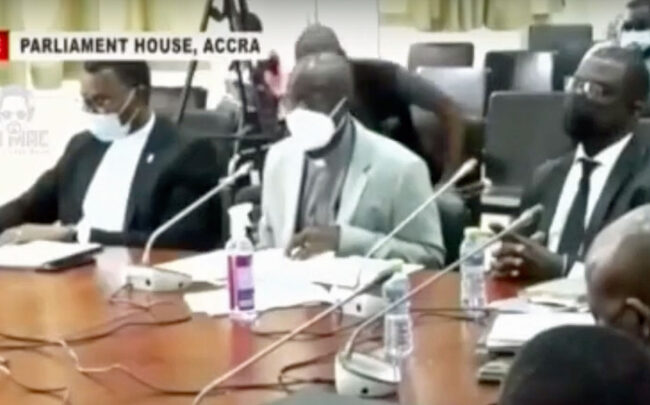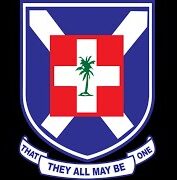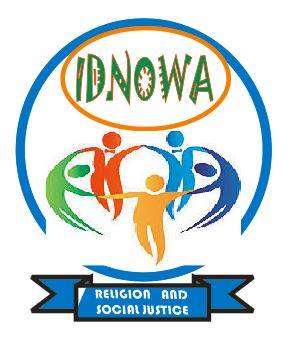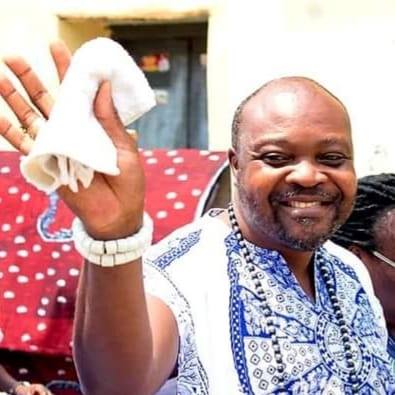The Presbyterian Church of Ghana has come out in favor of harsh penalties for public displays of same-sex affection and for anyone who supports LGBTQ rights — harsher penalties than those in Ghana’s controversial anti-LGBTQ bill currently awaiting action in Parliament. As soon as the church announced its position, it was promptly disputed by the LGBTQ-friendly Interfaith Diversity Network of West Africa (IDNOWA).

Dr. Rev. Benzies Isaac Adu-Okeree, chairman of the Presbyterian Church of Ghana, testifies on March 10 before the Parliament’s Committee on Constitutional, Legal and Parliamentary Affairs, which is studying the anti-LGBTQ bill. (Screen capture courtesy of My Joy Online)
Under Ghana’s current laws, consensual same-sex intimacy is punishable by up to three years in prison. In addition to many other homophobic provisions, the anti-LGBTQ bill would increase that punishment to three to five years in prison.
The bill would also make it a crime to work to establish LGBTQ rights (in the words of the bill, “encouraging or promoting … any activity that undermines the proper human sexual rights and Ghanaian family values stipulated in the Bill.” The punishment would be two to four months in prison.
Further, the bill would demand a six- to 12-month prison sentence for public displays of same-sex affection.

Shield of the Presbyterian Church of Ghana.
The Presbyterian Church argued for passage of the anti-LGBTQ bill, but said that some of its provisions are too lenient. In every case, the church says, the minimum sentence should be three years.
Davis Mac-Iyalla, chief executive of IDNOWA, testified against the bill at a previous hearing of the Committee on Constitutional, Legal and Parliamentary Affairs.
In response to the Presbyterian Church’s remarks on March 10, Mac-Iyalla said, “I still don’t understand which God is leading the Ghana Presbyterian Church to believe that the far-reaching anti-LGBTIQ Bill is not bad enough and calls for hasher law.”
Below are Mac-Iyalla’s responses to the statements made to the committee by Dr. Rev. Benzies Isaac Adu-Okeree, chairman of the Presbyterian Church of Ghana.
Adu-Okeree told the committee that extended sentences are “needed to deter unacceptable behaviours that are injurious to the common good of society.”

Logo of the Interfaith Diversity Network of West Africa
Mac-Iyalla said, “True religion calls us to love, mercy and compassion. Love does not dishonor others.”
Adu-Okeree said that homosexuality is taboo both in Christianity and in traditional Ghanaian culture.
Mac-Iyalla said, “That is false. There are different beliefs about marriage, gender and sexual ethics among Christians, among Muslims and among traditional religious communities. This is true throughout Ghana, I believe straight or gay are made by God and none is taboo. Neither is homosexuality.
Adu-Okeree implied that homosexuality is like incest and bestiality.

Davis Mac-Iyalla, executive director of the Interfaith Diversity Network of West Africa (IDNOWA)
Mac-Iyalla said, “Homosexuals are not created in labs, they are natural. It’s only when you allow incestuous reproduction that you have actual moral issues.”
Adu-Okeree said, “The practice and the promotion of [LGBTQ people] is in complete conflict of the teachings of Our Lord Jesus Christ and against the values and norms of the Ghanaian culture.”
Mac-Iyalla said, “As a Bible-believing Christian, I disagree, Genesis Chapter 1 describes God’s act of creation. I know from the Scriptures, and from scientific discovery, how endlessly diverse God’s creation has been.”
Adu-Okeree said that allowing the [LGBTQ] community’s activities “to fester” … “puts the human race’s natural existence in jeopardy.”
Mac-Iyalla said, “The Book of Leviticus contains list of forbidden behaviors, some of which are called abominations. These are rules about what counts as kosher, similar to the Muslim laws of halal and haram, They should not be the basis for Ghanaian secular laws.”
Reports about Adu-Okeree’s testimony came from Freedom Radio GH and My Joy Online.
Source: African Human Rights Media Network member Erasing 76 Crimes.
COMMENTS